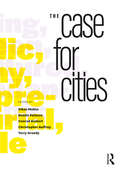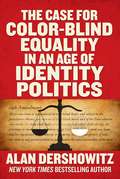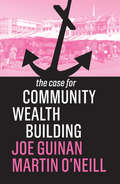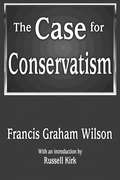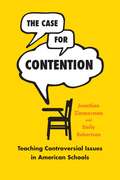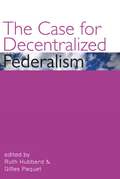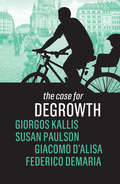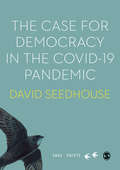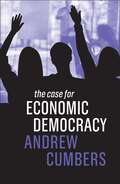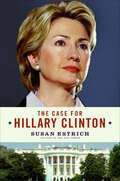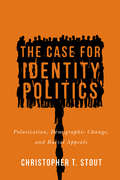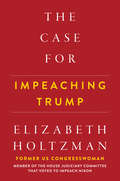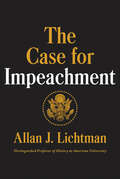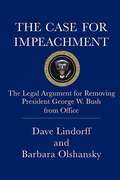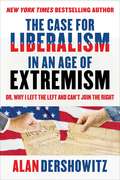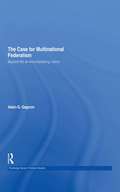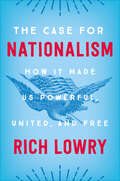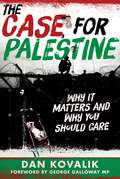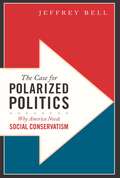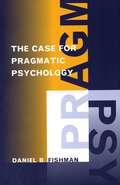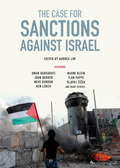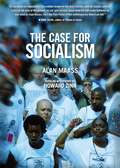- Table View
- List View
The Case for Cities
by Danilo Palazzo Vikas Mehta Conrad Kickert Christopher Auffrey Terry GrundyThe fateful year 2020 brought dramatic challenges to American cities. The COVID-19 pandemic and the civil unrest caused by the killing of George Floyd led to a cascade of negative media stories about cities, often politically motivated. It seemed possible that the economic and demographic gains cities had achieved over the last few decades could be lost. In fact, there has been measurable population loss in larger cities caused by changing work/life patterns and changing public perceptions about the costs and benefits of urban living. Faced with these challenges, advocates for cities must make a vigorous case for cities and show how they aren’t the cause of America’s social, environmental, economic, and public health problems but, in fact, are the places where the solutions to those problems will be found. The 38 chapters in The Case for Cities draw on the expertise of contributors from the academic, professional, and civic sectors to explore the creative tension between the two great values on which the vigor of cities depends––that they should be "Cities of Choice" (places where people who have choice want to live) and "Cities of Justice" (places that welcome and support people with limited choices). The book’s underlying perspective is that these two values are symbiotic and that promoting both is what leads to viable, sustainable urban resurgence. This book will be of keen interest to students and practitioners in urban planning, urban design, real estate, architecture, and landscape architecture and to urban advocates and civic leaders.
The Case for Color-Blind Equality in an Age of Identity Politics
by Alan DershowitzIn The Case for Color-Blind Equality in an Age of Identity Politics, Alan Dershowitz—New York Times bestselling author and one of America&’s most respected legal scholars—analyzes the current battles over issues of diversity and our rapidly changing ideas about what true diversity is. Alan Dershowitz has been called &“one of the most prominent and consistent defenders of civil liberties in America&” by Politico and &“the nation&’s most peripatetic civil liberties lawyer and one of its most distinguished defenders of individual rights&” by Newsweek. He is also a fair-minded and even-handed expert on civil liberties and constitutional rights, and in this book offers his knowledge and insight to help readers understand the war being waged against meritocracy and equal protection of the law by so-called progressive advocates. The Case for Color-Blind Equality in an Age of Identity Politics is an analysis of every aspect of the current fight against true diversity—diversity of philosophy, background, and opinion, rather than the more surface-level diversity of race, religion, and location. It examines the United States&’s history of systemic racism, debates about affirmative action, and ongoing reckoning with issues of bigotry against groups such as Asians, Blacks, and Jews, with an eye toward fairly balancing the concerns of a diverse populace. In the end, The Case for Color-Blind Equality in an Age of Identity Politics represents an icon in American law and politics exploring the current rapidly changing attitudes toward meritocracy, personal identity, and the preservation of civil liberties for all citizens, regardless of background, race, class, or creed. It is essential reading for anyone interested in or concerned about identity politics, racial issues, and true diversity and fairness in America.
The Case for Community Wealth Building (The Case For #2)
by Martin O'Neill Joe GuinanOur broken economic model drives inequality and disempowerment, lining the pockets of corporations while extracting wealth from local communities. How can we reverse this? Joe Guinan and Martin O’Neill argue for an approach that uses the power of democratic participation to drive equitable development and ensure that wealth is widely shared. They show how this model – Community Wealth Building – can transform our economic system by creating a web of collaborative institutions, from worker cooperatives to community land trusts and public banks, that empower and enrich the many, not the few. This book is essential reading for everyone interested in building more equal, inclusive, and democratic societies.
The Case for Conservatism: Three Lectures Delivered At The University Of Washington
by Francis WilsonConservative and liberal political impulses have contended throughout the history of the U.S. although there are no major Conservative or Liberal parties in the U.S. Instead, the terms signify general inclinations and prejudices encountered to some degree within all major political parties.In terms of contemporary politics, it is reasonably clear that liberalism and conservatism are meaningful terms. But the dichotomy is subject to much confusion when projected against a wider historical background. Francis Wilson's lectures on conservatism represent a genuinely philosophical approach. He generalizes upon the content of conservative thought without reducing the result to a mere psychological bent or disposition.Francis Wilson's volume was an expression of intellectual renewal of conservative ideas in the post-World War Two period. Initially published in 1951, it gave expression to the body of common belief that then and now constitutes the essence of conservatism. Lucid and temperate, he outlines the principles to which conservatives subscribe and how they have changed. Published in the Library of Conservative Thought series, The Case for Conservatism has continuing relevance to those who seek to understand the intellectual roots of the contemporary revival of conservative public policies.
The Case for Contention: Teaching Controversial Issues in American Schools
by Emily Robertson Jonathan ZimmermanFrom the fights about the teaching of evolution to the details of sex education, it may seem like American schools are hotbeds of controversy. But as Jonathan Zimmerman and Emily Robertson show in this insightful book, it is precisely because such topics are so inflammatory outside school walls that they are so commonly avoided within them. And this, they argue, is a tremendous disservice to our students. Armed with a detailed history of the development of American educational policy and norms and a clear philosophical analysis of the value of contention in public discourse, they show that one of the best things American schools should do is face controversial topics dead on, right in their classrooms. Zimmerman and Robertson highlight an aspect of American politics that we know all too well: We are terrible at having informed, reasonable debates. We opt instead to hurl insults and accusations at one another or, worse, sit in silence and privately ridicule the other side. Wouldn’t an educational system that focuses on how to have such debates in civil and mutually respectful ways improve our public culture and help us overcome the political impasses that plague us today? To realize such a system, the authors argue that we need to not only better prepare our educators for the teaching of hot-button issues, but also provide them the professional autonomy and legal protection to do so. And we need to know exactly what constitutes a controversy, which is itself a controversial issue. The existence of climate change, for instance, should not be subject to discussion in schools: scientists overwhelmingly agree that it exists. How we prioritize it against other needs, such as economic growth, however—that is worth a debate. With clarity and common-sense wisdom, Zimmerman and Robertson show that our squeamishness over controversy in the classroom has left our students woefully underserved as future citizens. But they also show that we can fix it: if we all just agree to disagree, in an atmosphere of mutual respect.
The Case for Decentralized Federalism (Governance Series)
by Hubbard, Ruth; Paquet, GillesThe Case for Decentralized Federalism and its sister volume The Case for Centralized Federalism are the outcome of the Federalism Redux Project, created to stimulate a serious and useful conversation on federalism in Canada. They provide the vocabulary and arguments needed to articulate the case for a centralized or a decentralized Canadian federalism. The Case for Decentralized Federalism brings together experts who believe decentralized federalism is the optimal arrangement for governing the contextual diversity and cultural pluralism in Canada. Using different approaches, they argue that by dividing the work of public governance among different levels of government, it is easier to address the needs and aspirations of the diverse groups that make up Canada.
The Case for Degrowth
by Susan Paulson Giacomo D'Alisa Federico Demaria Giorgos KallisThe relentless pursuit of economic growth is the defining characteristic of contemporary societies. Yet it benefits few and demands monstrous social and ecological sacrifice. Is there a viable alternative? How can we halt the endless quest to grow global production and consumption and instead secure socio-ecological conditions that support lives worth living for all? In this compelling book, leading experts Giorgos Kallis, Susan Paulson, Giacomo D’Alisa and Federico Demaria make the case for degrowth - living well with less, by living differently, prioritizing wellbeing, equity and sustainability. Drawing on emerging initiatives and enduring traditions around the world, they advance a radical degrowth vision and outline policies to shape work and care, income and investment that avoid exploitative and unsustainable practices. Degrowth, they argue, can be achieved through transformative strategies that allow societies to slow down by design, not disaster. Essential reading for all concerned citizens, policy-makers, and students, this book will be an important contribution to one of the thorniest and most pressing debates of our era.
The Case for Democracy in the COVID-19 Pandemic (SAGE Swifts)
by David SeedhouseOne moment life was normal, the next, governments around the world were imposing radical lockdowns of their populations. But why were decision-makers so readily ignoring centuries of hard-won civil freedoms? Where was the discussion of ethics and human rights? Why were we so easily controlled and why were our controllers so willing to do it? In The Case for Democracy, David Seedhouse explores the psychological biases; distorted risk perceptions; frenetic journalism; the disputed science; the narrow focus of ′experts′; value judgements dressed up as truths; propaganda; the invisibility of ethics; and the alarming irrelevance of inclusive democracy that have been features of governmental responses to the covid-19 pandemic. Seedhouse argues that the chaotic governmental response to Coronavirus, with no attempt to include the public, is the perfect argument for an extensive, participatory democracy; a democracy that demonstrates practical decision making by listening to everyone’s knowledge and expertise. Now is the time for us to solve our problems together.
The Case for Democracy in the COVID-19 Pandemic (SAGE Swifts)
by David SeedhouseOne moment life was normal, the next, governments around the world were imposing radical lockdowns of their populations. But why were decision-makers so readily ignoring centuries of hard-won civil freedoms? Where was the discussion of ethics and human rights? Why were we so easily controlled and why were our controllers so willing to do it? In The Case for Democracy, David Seedhouse explores the psychological biases; distorted risk perceptions; frenetic journalism; the disputed science; the narrow focus of ′experts′; value judgements dressed up as truths; propaganda; the invisibility of ethics; and the alarming irrelevance of inclusive democracy that have been features of governmental responses to the covid-19 pandemic. Seedhouse argues that the chaotic governmental response to Coronavirus, with no attempt to include the public, is the perfect argument for an extensive, participatory democracy; a democracy that demonstrates practical decision making by listening to everyone’s knowledge and expertise. Now is the time for us to solve our problems together.
The Case for Economic Democracy (The Case For)
by Andrew CumbersThe idea that the people have a right to shape political decisions through democratic means is widely accepted. The same cannot be said of the decisions that impact on our everyday economic life in the workplace and beyond. Andrew Cumbers shows why this is wrong, and why, in the context of the rising tide of populism and the perceived crisis of liberal democracy, economic democracy's time has come. Four decades of market deregulation, financialisation, economic crisis and austerity has meant a loss of economic control and security for the majority of the world's population. The solution must involve allowing people to 'take back control' of their economic lives. Cumbers goes beyond older traditions of economic democracy to develop an ambitious new framework that includes a traditional concern with workplace rights and collective bargaining, but shifts the focus to include consideration of individual economic rights and processes of public engagement and deliberation beyond the workplace. This topical and original book will be essential reading for anyone interested in radical solutions for our economic and political crises.
The Case for Hillary Clinton
by Susan EstrichWith the Bush administration now in its final years, all eyes are turning to the 2008 political season -- especially those of Democratic voters, who are casting about for a galvanizing leader to help them win back the White House.And in that role, argues longtime political strategist Susan Estrich, no candidate even approaches the power and promise of Hillary Rodham Clinton, the senator from New York. She is, by far, not only the most popular Democratic leader in the country, but also one of its most popular and admired politicians, period. Both a passionate spokesperson for progressive values and a strong advocate for our troops overseas, she has used her time in the Senate to establish herself successfully as a genuine political powerhouse. There is no candidate whose election would bring such vitality and lasting change into the White House. And she offers Americans a once-in-a-lifetime chance to break the world's most prominent glass ceiling and elect a female president of the United States.In an atmosphere where conservative Hillary-bashing is still as virulent as ever, Estrich demonstrates all the reasons that this principled leader still blows away any other potential contender in the early polls for 2008. And, with arguments both stirring and sensible, she reminds us that if Hillary should succeed, America and the world would be changed forever and for the better.
The Case for Identity Politics: Polarization, Demographic Change, and Racial Appeals (Race, Ethnicity, and Politics)
by Christopher T. StoutFollowing the defeat of Hillary Clinton in the presidential election of 2016, many prominent scholars and political pundits argued that a successful Democratic Party in the future must abandon identity politics. While these calls for Democrats to distance themselves from such strategies have received much attention, there is scant academic work that empirically tests whether nonracial campaigns provide an advantage to Democrats today. As Christopher Stout explains, those who argue for deracialized appeals to voters may not be considering how several high-profile police shootings and acquittals, increasing evidence of growing racial health and economic disparities, retrenchments on voting rights, and the growth of racial hate groups have made race a more salient issue now than in the recent past. Moreover, they fail to account for how demographic changes in the United States have made racial and ethnic minorities a more influential voting bloc. The Case for Identity Politics finds that racial appeals are an effective form of outreach for Democratic candidates and enhance, rather than detract from, their electability in our current political climate.
The Case for Impeaching Trump
by Elizabeth HoltzmanThe former US Congresswoman &“offers the Watergate investigation as a model for the kind of open, wide-ranging inquiry that she argues is necessary.&” —The New York Review of Books Elizabeth Holtzman has been a principled leader and a persistent voice for equality and accountability since she became the youngest woman ever elected to Congress in 1973, which she remained for forty-two years. But she saw American democratic ideals, and the rule of law in the United States, eroding under President Trump. And as a member of the House Judiciary Committee that voted to impeach Nixon, and one of the members of the Homeland Security advisory council who resigned in protest of President Donald Trump&’s policy of separating families at the border, former Congresswoman Holtzman knows of which she speaks. The Case for Impeaching Trump establishes the requirements for impeachment as set out by the Constitution and proves that President Trump&’s actions met those requirements. Holtzman makes the definitive, constitutional case that impeachment was justified. &“Elizabeth Holtzman has always been the first and the bravest, the smartest and most trusted. She is the expert we need to deal with an accidental President who got there as a serial sexual harasser, a candidate who lost the popular vote, and an unsuccessful businessman who was born on third base and thinks he hit a home run. Now what? Ask Liz!&” —Gloria Steinem Praise for Elizabeth Holtzman &“A forceful advocate.&” —USA Today &“Considered one of the brightest stars in New York City politics, earning a reputation for intelligence and honesty.&” —The Washington Post &“A Watergate hero.&” —The New Republic &“A woman of integrity who lives by her principles.&” —Publishers Weekly
The Case for Impeachment
by Allan J. LichtmanNATIONAL BESTSELLER “Lichtman has written what may be the most important book of the year.” —The HillWhat are the ranges and limitations of presidential authority? What are the standards of truthfulness that a president must uphold? What will it take to impeach Donald J. Trump? Professor Allan J. Lichtman, who has correctly forecasted thirty years of presidential outcomes, answers these questions, and more, in TheCase for Impeachment—a deeply convincing argument for impeaching the 45th president of the United States. In the fall of 2016, Allan J. Lichtman made headlines when he predicted that Donald J. Trump would defeat the heavily favored Democrat, Hillary Clinton, to win the presidential election. Now, in clear, nonpartisan terms, Lichtman lays out the reasons Congress could remove Trump from the Oval Office: his ties to Russia before and after the election, the complicated financial conflicts of interest at home and abroad, and his abuse of executive authority.The Case for Impeachment also offers a fascinating look at presidential impeachments throughout American history, including the often-overlooked story of Andrew Johnson’s impeachment, details about Richard Nixon’s resignation, and Bill Clinton’s hearings. Lichtman shows how Trump exhibits many of the flaws (and more) that have doomed past presidents. As the Nixon Administration dismissed the reporting of Bob Woodward and Carl Bernstein as “character assassination” and “a vicious abuse of the journalistic process,” Trump has attacked the “dishonest media,” claiming, “the press should be ashamed of themselves.”Historians, legal scholars, and politicians alike agree: we are in politically uncharted waters—the durability of our institutions is being undermined and the public’s confidence in them is eroding, threatening American democracy itself.Most citizens—politics aside—want to know where the country is headed. Lichtman argues, with clarity and power, that for Donald Trump’s presidency, smoke has become fire.
The Case for Impeachment: Articles of Impeachment
by the Office of Legal Counsel of the Center for American ValuesYou could be reading this headline in your newspaper sooner than you might think. Privately, any Democrats believe that impeachment proceedings are inevitable--and probably will begin within six months. PRESIDENT CLINTON IMPEACHMENT! WASHINGTON--By a vote of 72 to 28, the United States Senate voted today to impeach President William Jefferson Clinton. His removal from the office of the Presidency is effective immediately. He now faces criminal charges... In this book, you'll read shocking facts buried by the media, including... The selling of the Presidency to Communist China... in exchange for campaign contributions. Massive election fraud that makes political corruption in Third World countries pale by comparison. The use of IRS audits to intimidate and punish Clinton's political opponents. Details on how Clinton's White House security office was using the FBI to do "opposition research" on Republicans and critics of the Clintons. Al Gore's admission in a televised press conference that he indeed did commit a felony by illegally using his White House office to raise millions dollars for the 1996 Clinton-Gore re-election campaign. Attorney General Janet Reno's running of the most politicized Justice Department in U.S. history.
The Case for Impeachment: The Legal Argument for Removing President George W. Bush from Office
by Dave Lindorff Barbara Olshansky(From the book jacket) THE WAR IN IRAQ. NO-BID CONTRACTS AWARDED TO HALLIBURTON. HURRICANE KATRINA. THE CIA LEAK INVESTIGATION. ILLEGAL WIRETAPPING. THE STORY just keeps getting worse. The evidence is glaring. George W. Bush's record as a president is abysmal. And it's time to impeach him. The Case for Impeachment lays out the reasons why in a straightforward, letter-of-the-law manner. Juxtaposing hard facts with the lies and deceptions of this administration, The Case for Impeachment is a serious consideration of Bush's high crimes and misdemeanors while in office. This important and timely book will serve as a rallying cry for all those fed up with George W. Bush's abuses of power.
The Case for Liberalism in an Age of Extremism: or, Why I Left the Left But Can't Join the Right
by Alan Dershowitz&“Maybe the question isn&’t what happened to Alan Dershowitz. Maybe it&’s what happened to everyone else.&”—PoliticoIn The Case for Liberalism in an Age of Extremism, Alan Dershowitz—New York Times bestselling author and one of America&’s most respected legal scholars—makes a classical liberal argument for centrist government in the US, as the Founding Fathers and the Constitution intended. Alan Dershowitz has been called &“one of the most prominent and consistent defenders of civil liberties in America&” by Politico and &“the nation&’s most peripatetic civil liberties lawyer and one of its most distinguished defenders of individual rights&” by Newsweek. Yet he has come under intense criticism for his consistent classical liberalism in the face of a rapidly polarizing political landscape and for his steadfast support of centrist governance over either &“progressive&” or reactionary radicalism. The Case for Liberalism in an Age of Extremism is a defense of liberalism and its renewed relevance today. It makes the case for classic liberal values and programs over radical-left and reactionary right-wing agendas, and for centrism over extremism in general, showing why the United States has thrived throughout history because of its enduringly centrist base. It seeks to restore contemporary liberalism to its important place in the American political landscape, and attempts to persuade centrists from both the left and right—who may today call themselves progressives or moderate conservatives—that they, too, belong in the big tent of centrist liberalism. As a professor for half a century, Dershowitz never told students what values to accept or which candidates to support, but helped guide them to conclusions based on their own sets of values. He does the same in this book. A guide for all readers, rather than a piece of political advocacy for one party or another, The Case for Liberalism in an Age of Extremism is Alan Dershowitz&’s argument for classical liberal values and their role in forming just societies and protecting against the dangers of extremism, just as they must today. It is essential reading for anyone interested in or concerned about political polarization on both the far-right and -left, and for everyone seeking a middle path between the extremes.
The Case for Medicare for All (The Case For)
by Gerald FriedmanLargely privately funded with relatively little public regulation, the United States healthcare system is both expensive and inefficient, providing poor care to large parts of the population. For decades, Americans have wrestled with how to fix their broken healthcare system. In this razor-sharp contribution to the healthcare debate, leading economist and former adviser to Bernie Sanders Gerald Friedman recommends that we build on what works: a Medicare system that already efficiently provides healthcare for millions of Americans. Rejecting the discredited idea that healthcare should be treated like any other commodity, Friedman shows that healthcare is distinctive and can be best provided only through universal program of social insurance. Deftly exposing the absurdities of the opponents of reform, Friedman shows in detail how the solution to our health care crisis is staring us in the face: enroll everyone in Medicare to improve the health of all Americans. This bold and brilliantly argued book is essential reading for anyone who wants to see Congress and the White House act to provide America with a 21st century healthcare system.
The Case for Multinational Federalism: Beyond the all-encompassing nation (Routledge Studies in Federalism and Decentralization #Vol. 18)
by Alain-G. GagnonThroughout the world, liberal-democracies are grappling with increasing claims made in the name of minority national, socio-cultural and ethno-cultural identities that seek greater recognition in the institutions of the nation-state. This work inserts itself into debates centred on diversity through a normative and empirical analytical assessment of the political sociology of multinational democracies. The main thread of the arguments put forward is that federalism, in both its institutional manifestations and its sociological properties, constitutes a promising avenue for the management of cohabitating political communities and for the affirmation of collective identities within states that are constituted by two or more nations. Author Alain-G Gagnon develops his argument by contending that the federal principle allows for the exercise of advanced democratic practices within nation-states, permitting internal nations to openly affirm the bases of adherence to a common political project. At the same time, he argues that federalism nourishes the development of distinct collective traditions that serve to benefit all parties to the association. It is concluded that only in such a scenario will the elusive pursuit of an authentic and shared loyalty underpin multination states and ensure their stability, in contrast to the instrumental sentiments of belonging engendered by procedural territorial federal models. Focusing primarily on the Canadian case, this book also draws inspiration from other federal states (Belgium, the United States), as well as federalizing states (Spain, the United Kingdom). It will be of keen interest to students and scholars of Politics, European Studies, along with Nationalism and Federalism Studies.
The Case for Nationalism: How It Made Us Powerful, United, and Free
by Rich LowryIt is one of our most honored clichés that America is an idea and not a nation. This is false. America is indisputably a nation, and one that desperately needs to protect its interests, its borders, and its identity. The Brexit vote and the election of Donald Trump swept nationalism to the forefront of the political debate. This is a good thing. Nationalism is usually assumed to be a dirty word, but it is a foundation of democratic self-government and of international peace.National Review editor Rich Lowry refutes critics on left and the right, reclaiming the term “nationalism” from those who equate it with racism, militarism and fascism. He explains how nationalism is an American tradition, a thread that runs through such diverse leaders as Alexander Hamilton, Teddy Roosevelt, Martin Luther King, Jr., and Ronald Reagan. In The Case for Nationalism, Lowry explains how nationalism was central to the American Project. It fueled the American Revolution and the ratification of the Constitution. It preserved the country during the Civil War. It led to the expansion of the American nation’s territory and power, and eventually to our invaluable contribution to creating an international system of self-governing nations. It’s time to recover a healthy American nationalism, and especially a cultural nationalism that insists on the assimilation of immigrants and that protects our history, civic rituals and traditions, which are under constant threat. At a time in which our nation is plagued by self-doubt and self-criticism, The Case for Nationalism offers a path for America to regain its national self-confidence and achieve continued greatness.
The Case for Palestine: Why It Matters and Why You Should Care
by Dan KovalikIn 1948, the State of Israel was founded. While the philosophy of Zionism that advocated for a Jewish homeland in what was then known as Palestine dates back to 1897, the creation of Israel in 1948 was justified by the terrible crime of the Holocaust committed by Nazi Germany during WWII. Many defenders of Israel would like us to believe that the creation of Israel was a peaceful process on a barely populated land, however, this is far from true. Rather, the creation of Israel was accompanied by what is known by the Palestinians as the Nakba(catastrophe)—an operation in which 700,000 Palestinians were violently expelled from their land and their homes. Since that time, Israel has continued to usurp more and more land from the Palestinians who they falsely portray as a people without a history and without a culture. Israel has been particularly cruel to the people of Gaza—70 percent of whom are refugees from the 1948 Nakba. Gaza has been converted by Israel into what some call a giant open-air prison surrounded by barbed wire. It is in this context that we are currently witnessing the tragic violence between Israel and the people of Gaza—violence on a scale not seen in this land since the Nakba of 1948. Indeed, many Palestinians are calling this a second Nakba, with around 1.5 million Palestinians already displaced and thousands killed. All of this is being accomplished by Israel with critical military and diplomatic support from the United States. This second Nakba is also being facilitated by the mainstream press that both downplays and justifies what many believe to be genocidal violence against the Palestinian people. The Case for Palestine is written as a counternarrative, with the hope that, if the truth is told, this violence and displacement can be stopped before it is too late; before Gaza is no more.
The Case for Polarized Politics
by Jeffrey BellNo movement resembling American social conservatism exists anywhere else in the world of affluent democracy encompassing western Europe and Japan. This simple, undeniable fact has led many commentators to treat social conservatism as a "retro" movement soon to disappear in the U. S. as well, an inevitable (if lagging) casualty of global modernization.Author and political activist Jeffrey Bell argues that social conservatism is uniquely American because it is in reality an outgrowth of American exceptionalism. It exists here because the founding principles of the United States-centering on the belief that humanity receives its equal rights directly from God rather than from government-retain a mass following among American voters, even in the wake of abandonment of belief in America's theistic founding by elites and institutions that once espoused it. This allegiance to the founding, rather than some quasi-theocratic project by what is frequently misnamed the "religious right," accounts for social conservatism's comparatively recent birth and persistent strength in U. S. politics-and also for its absence in societies whose foundings were not rooted in the universality of God-given human rights.Bell argues that a worldwide upheaval in the 1960s set the stage for the rise of social conservatism, which had no earlier political existence. The 1960s upheaval resulted in the triumph of the social agenda of the left, particularly the sexual revolution, among elite opinion in the United States as well as in Europe, Japan and elsewhere. In subsequent decades the global left has sidelined its century-long drive for socialism and returned to its late-eighteenth-century roots in the thought of Jean-Jacques Rousseau and the radical French revolutionaries known as the Jacobins, who believed human fulfillment depends on liberation from most civilized institutions, particularly organized religion and the family.Despite the many predictions of its demise, social conservatism has gained and held popular strength in the U. S. because of its roots in a theistic version of the European enlightenment of the 17th and 18th centuries, which Bell describes and analyzes as the "conservative enlightenment." It is a rich, optimistic belief system that not only dominated the American founding but transformed society in the English-speaking world and remains an attractive alternative in the eyes of many of the world's peoples-certainly in comparison to the competing universalisms advocated by the left enlightenment and by the anti-egalitarian Islamic revival. The ability of social conservatism and of its parent, the conservative enlightenment, to revive and spread this natural law-centered democratic vision could reshape the battle of ideas that increasingly defines our post-Cold War world.
The Case for Pragmatic Psychology (Early American Places)
by Daniel FishmanThe best method is the one that works: &“Should be read not only by professional psychologists but by anyone interested in the future of mind-related science.&” —John Horgan, author of The End of Science A cursory survey of the field of psychology reveals raging debate among psychologists about the methods, goals, and significance of the discipline—psychology&’s own version of the science wars. The previous unification of the discipline has given way to a proliferation of competing approaches, a postmodern carnival of theories and methods that calls into question the positivist psychological tradition. Bridging the gap between the traditional and the novel, Daniel B. Fishman proposes an invigorated, hybrid model for the practice of psychology–a radical, pragmatic reinvention of psychology based on databases of rigorous, solution-focused case studies. In The Case for Pragmatic Psychology, Fishman demonstrates how pragmatism returns psychology to a focus on contextualized knowledge about particular individuals, groups, organizations, and communities in specific situations, sensitive to the complexities and ambiguities of the real world. Fishman fleshes out his theory by applying pragmatic psychology to two contemporary psychosocial dilemmas —the controversies surrounding the &“psychotherapy crisis&” generated by the growth of managed care, and the heated culture wars over educational reform. Moving with ease from the theoretical to the nuts and bolts of actual psychological intervention programs, Fishman proffers a strong argument for a new kind of psychology with far-reaching implications for enhancing human services and restructuring public policy.
The Case for Sanctions Against Israel
by Naomi Klein Ilan Pappe Slavoj Zizek Omar Barghouti Ra'Anan AlexandrowiczIn July 2011, Israel passed legislation outlawing the public support of boycott activities against the state, corporations, and settlements, adding a crackdown on free speech to its continuing blockade of Gaza and the expansion of illegal settlements. Nonetheless, the campaign for boycott, divestment, and sanctions (BDS) continues to grow in strength within Israel and Palestine, as well as in Europe and the US.This essential intervention considers all sides of the movement--including detailed comparisons with the South African experience--and contains contributions from both sides of the separation wall, along with a stellar list of international commentators.Contributors: Merav Amir and Dalit Baum, Ra'anaan Alexandrowicz, Hind Awwad, Mustafa Barghouthi, Omar Barghouti, Joel Beinin, John Berger, Angela Davis, Nada Elia, Marc Ellis, Noura Erakat, Ran Greenstein, Neve Gordon, Ronald Kasrils, Jamal Khader, Naomi Klein, Mark LeVine, Ken Loach, David Lloyd and Laura Pulido, Haneen Maikey, Ilan Pappe, Jonathan Pollak, Lisa Taraki, Rebecca Vilkomerson, Michael Warschawski, Slavoj i ek.
The Case for Socialism (Updated Edition)
by Howard Zinn Alan MaassIs socialism an impossible, discredited dream or the only realistic path for human survival? If you're not sure of the answer, or are just curious about what the Left really believes in, you need to read Maass. He's the Tom Paine of the contemporary American left."--Mike Davis, author of Planet of Slums"This is a vivid, fluent and rare book about socialism for those uninterested in tracts and excited by new prospects."--John Pilger, author of Freedom Next TimeGrowing numbers of people are disgusted by the disaster of poverty, war, oppression, and environmental destruction caused by global capitalism. But is there an alternative? Author Alan Maass argues that socialism-a democratically planned economy based on workers' control-is rational, necessary, and possible. With an afterword by Howard Zinn.Alan Maass is the editor of the website SocialistWorker.org.
